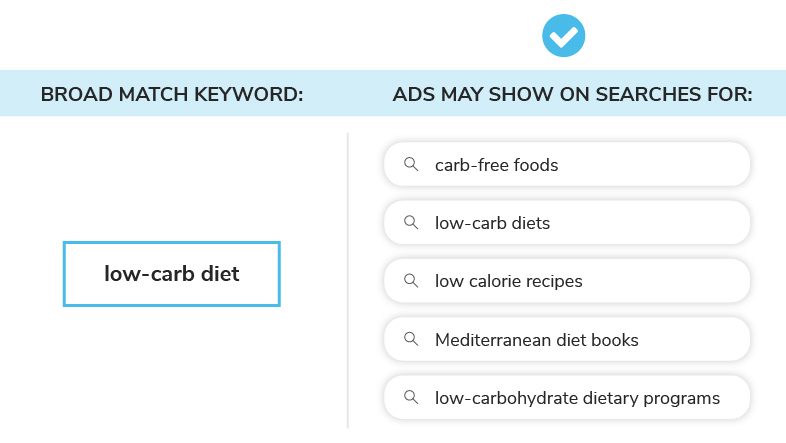4 Keyword Match Types That Make (Or Break) Paid Search Ads

This blog explains the 4 keyword match types and why it’s essential to know when to use each type to deliver the best results out of your paid search campaigns.
Keyword match types are the oomph behind paid search advertising. Understanding each match type and how to use them effectively in your paid search campaigns is crucial to driving results. But before we get into it all, let’s give a little context.
What Is A Keyword?

Keywords, sometimes known as “search queries,” are those words, phrases, and questions that people type into search engines to find information. When you are “googling,” you are using keywords to trigger the answer to your question.
Keywords are the building blocks behind PPC advertising and Search Engine Optimization (SEO). Put a pin in the SEO convo. We’ll talk about that more in a future blog. When it comes to PPC advertising, keywords are what determines when your paid search ad gets shown to prospective customers. If used correctly, your keywords will put your company in front of interested buyers precisely when they are searching for a product or service you provide. That’s why understanding the different match types and how they work is critical.
1. Broad Match Keywords
Broad match keywords are precisely that — broad and not detailed to your specific product or service. Your ad may show up on searches that generally relate to your keyword. Broad match keywords reach the widest possible audience, which also means you have the opportunity to drive a large volume of traffic to your website.
What Ads Will Show With Broad Match Keyword Searches?

However, Broad match keywords also deliver the least amount of control over who sees your ad. To this end, Broad match keywords have the lowest ad relevance, meaning your ad could get a whole lot of clicks (that you pay for) from people who aren’t specifically searching for your product or service. The traffic to your website will be more random than refined, with visitors who are unlikely to convert into buyers — eating up your ad budget quickly.
2. Phrase Match Keywords
Phrase match keywords refine the search query, showing your ad when other words or phrases appear before or after your exact keyword. With Phrase match keywords, your ads may show up on searches that include the meaning of your keyword. Compared to Broad match, Phrase match gives advertisers more control over who sees the ad, increasing the ad relevance by reducing the risk of your ad showing up for unwanted search queries. A common example of a Phrase match is adding the words “near me” to your targeted keyword.
What Ads Will Show With Phrase Match Keyword Searches?

3. Exact Match
Exact match keywords are the most specific of all keyword match types, providing you the greatest control over who views your ad. With Exact match, your ad will only appear in searches that have the exact meaning or intent as the keyword. With the tight control of Exact match, your keywords are at their most targeted. Meaning data will easily show which keywords are working well by delivering quality leads and converting to purchases, and which are not.
What Ads Will Show With Exact Match Keyword Searches?

This tight control, though, comes at a cost. Casting that narrowed net means your ad won’t be served as often. And, when it is served and clicked, you’ll pay more. Of course, if the click translates into a great lead or a sale, that higher price might be easy to overlook. But, it’s important to keep in mind.
4. Negative Match
If keywords are the hamburger of PPC, then negative keywords are the secret sauce. Negative keywords are the opposite of keywords. They prevent your ad from being triggered by a specific word or phrase. Meaning you eliminate the searches from people who aren’t looking for your product or service. As a result, Negative keywords ensure that your ads are highly relevant, garnering the right audience to drive conversions while reducing wasted money on useless clicks. Plus, Negative keywords can be used as a Negative Broad match, Negative Phrase match, and a Negative Exact match. with each negative match type providing similar levels of control to regular keywords.
What Ads Will Show With Negative Match Keyword Searches?

While Negative keywords let you maximize your PPC campaign’s effectiveness, it’s crucial to do your research on which Negative keywords to use and choose them carefully. Using too many negative keywords might make your ads reach too few customers. That’s why it’s imperative to monitor new data and adjust your negative keyword list as needed.
The Key To Keywords
Keyword matching is powerful stuff. Knowing how to harness that power truly is the way to get the most out of your PPC advertising. We can help.
WE KNOW THE KEY TO KEYWORDS
Let's Chat.

Written By
Lori Weisberg
Lori lives by the mantra, “It’s not what you say; it’s how you say it.” As Director of Content and Client Strategy, Lori is the wordsmithing wind beneath many of our clients’ wings. Known for capturing our clients’ brand voices with compelling clarity and consistency, she also is a frequent Tuna blog contributor. When not perusing a thesaurus, Lori can be found adding more zing to her arrabbiata sauce or searching for an easier way to pill a cat.
